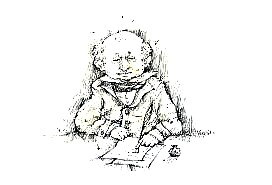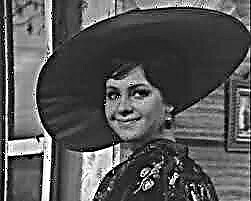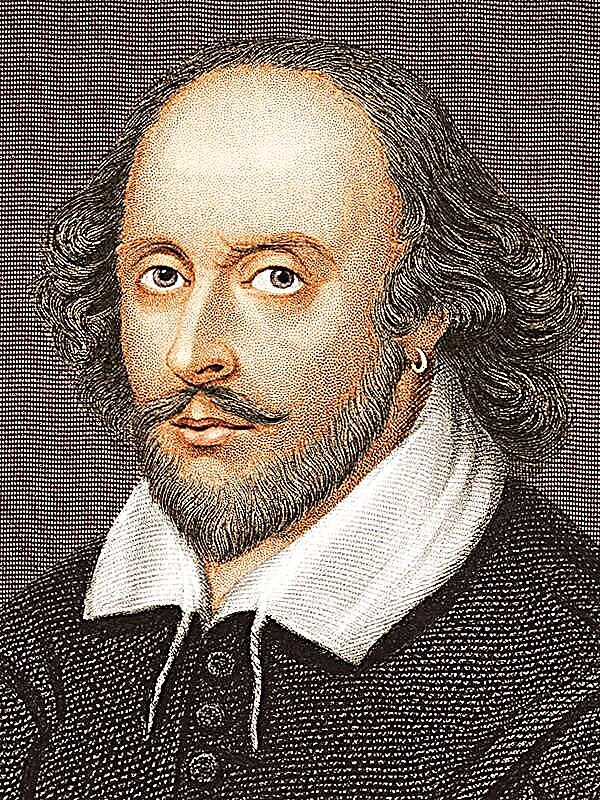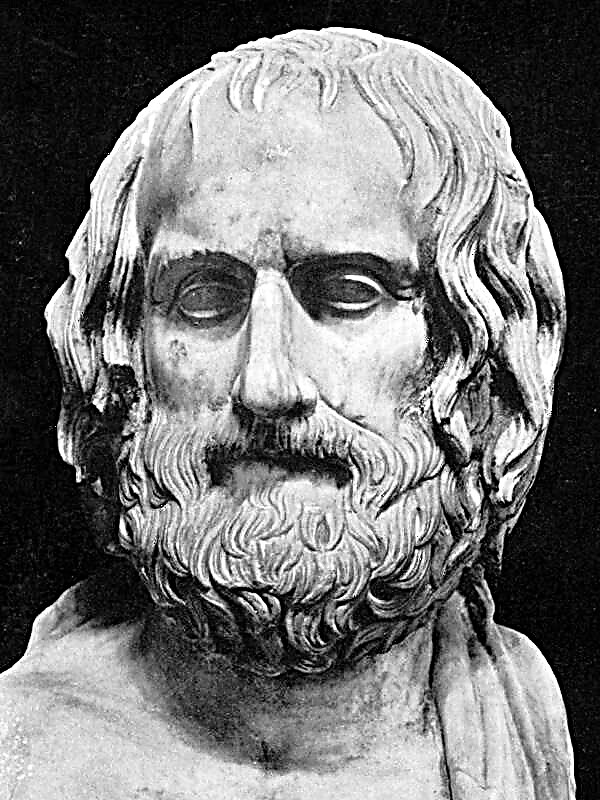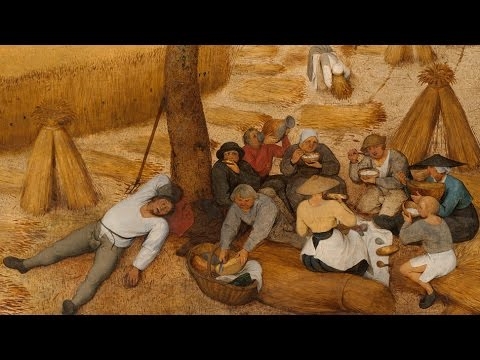In Rome, Caesar delivers a speech at the Temple of Concord. He fought a lot and finally returned to Rome. Rome is powerful; it inspires fear in all nations. For the great glory of Rome, it remains only to conquer the Parthians and avenge their victory over Crassus. The defeat in the battle with the Parthians became a shameful stain on Rome, and Caesar was ready either to fall on the battlefield or to deliver the captured Parthian king to Rome. No wonder Caesar gathered the color of Rome in the Temple of Concord. He expects consent and readiness from the Romans to march against the Parthians. Cimbre objects: now is not up to the Parthians; the civil massacre that began during the Gracchus does not cease, the Roman Empire is covered in blood: "first you need to be at home / Order and revenge for Rome / Not before it becomes the former Rome." Anthony supports Caesar: there was no case that the Romans did not avenge the death of the Roman commander. If you do not take revenge on the Parthians, many conquered peoples will decide that Rome faltered, and will not want to endure its domination. A trip to the Parthians is necessary, it remains only to decide who will lead the troops, but who, under Caesar, dares to call himself a leader? “Rome” and “Caesar” mean the same thing now, and the one who today wants to subordinate the common greatness to personal interests is a traitor. The word takes Cassius. He is an opponent of a military campaign, he is concerned about the fate of the motherland: “Let the consul be the consul, the Senate / the Senate and the stands the stands, / And may the true people fill, / As before, the forum.” Cicero says he is still faithful to the dream of a common good, peace and freedom. The Roman Republic has long ceased to honor the laws. When order triumphs in Rome, then weapons will not be needed, "so that the enemies / I will suffer the fate of the clouds driven by the wind." Brutus begins his speech by saying that he does not love Caesar, because, in his opinion, Caesar does not love Rome. Brutus does not envy Caesar, for he does not consider him superior to himself, and does not hate him, because Caesar is not afraid of him. Brutus reminds Caesar how the helpful consul wanted to put a royal crown on him, but Caesar himself pushed his hand away because he realized that the people are not as thoughtless as they would like, the people can endure for some time the tyrant, but not the autocrat . In his heart Caesar is not a citizen, he dreams of a royal crown. Brutus calls on Caesar to become not an oppressor, but a liberator of Rome. He, Brutus, is a citizen and wants to awaken civic feelings in Caesar's soul. Anthony condemns Brutus for impudent speeches. Caesar wants the question of going to the Parthians to be resolved here in the Temple of Concord, and to solve the remaining issues he proposes to meet tomorrow morning in the Curia of Pompey.
Cicero and Cimvre are waiting for their like-minded people - Cassius and Brutus. They understand that the homeland is in danger and can not be delayed. Cicero sees that Caesar, making sure that universal fear is more reliable for him than the love of a corrupt mob, relies on the army. Leading the Roman warriors into battle with the Parthians, he deals the last blow to Rome. Cicero regrets that he is already an old man and cannot fight for his homeland with a sword in his hands. Cassius arriving in time bitterly says that Cicero no longer has worthy listeners, but Cicero objects: the people are always the people. No matter how insignificant a person is, alone with himself, in people, he invariably transforms. Cicero wants to give a speech to the people. The dictator relies on strength, but Cicero relies on the truth and therefore is not afraid of strength: "Caesar will be defeated, / As soon as he is exposed." Cimbre is sure that Cicero will not be able to enter the forum, for the path there is closed, and if he could, his voice would be drowned in the cries of bribed people. The only remedy is the sword. Cassius supports Kimvra: you do not have to wait until the cowardly people declare Caesar tyrant, you must first pronounce him a sentence and carry him out. The best remedy is the fastest. To end slavery in Rome, one sword and one Roman are enough, why sit down and spend time swinging? Brutus appears. He was late because he spoke with Anthony. Caesar sent Anthony to Brutus to arrange a meeting. Brutus agreed to meet Caesar here in the temple, for he believes that Caesar the enemy is worse than Caesar the friend. Cassius says that he, Cimvre and Cicero are unanimous in their hatred of Caesar, in their love of their homeland and in their readiness to die for Rome. “But there were three plans: / To plunge the homeland into a civil war, / Ile, calling a lie a lie, to disarm / The people, or Caesar, to finish off in Rome.” He asks Brutus for an opinion. Brutus wants to try to convince Caesar. He believes that the thirst for honor is more valuable to Caesar than the thirst for the kingdom. Brutus sees in Caesar not a villain, but an ambitious one. During the Battle of Farsal, Brutus was captured by Caesar. Caesar saved his life, and Brutus does not want to respond to good with ingratitude. Brutus believes that Caesar alone can restore freedom, power and life to Rome today if he becomes a citizen again. Brutus believes that Caesar has a noble soul and he will become the protector of laws, and not their violator. If Caesar remains deaf to his arguments, Brutus is ready to stab him with a dagger. Cicero, Cimvre and Cassius are sure that Brutus has too high an opinion about Caesar and his plan is unrealizable.
Anthony reports to Caesar that Brutus agrees to meet with him. He hates Brutus and does not understand why Caesar tolerates him. Caesar says that of his enemies Brutus is the only one who is worthy of him. Caesar prefers to win not by arms, but by mercy: forgiving a worthy enemy and securing his friendship is better than destroying him. So at one time Caesar acted with Brutus, so intends to do so in the future. He wants by all means to make Brutus his friend. When Brutus arrives, Anthony leaves them alone. Brutus appeals to Caesar's mind. He conjures him to become a citizen again and restore freedom, glory and peace to Rome. But Caesar certainly wants to conquer the Parthians. He fought so much that he wants to meet death on the battlefield. Caesar says that he loves Brutus like a father. But Brutus feels Caesar's feelings one after another, except for envy: when Caesar shows himself to be a tyrant, Brutus hates him, when a man and citizen speaks in Caesar, Brutus loves and adores him. Caesar reveals to Brutus that he is his father. In evidence, he shows Brutus a letter to his mother Servilia confirming that Brutus is her son from Caesar. Brutus is stunned, but this news does not change his beliefs. He longs to save his homeland or perish. Caesar hopes that Brutus will change his mind and tomorrow will support him in the Senate, otherwise he will meet in Caesar not his father, but his master. Brutus calls on Caesar to prove his fatherly love and give him the opportunity to be proud of his father, otherwise he will have to assume that his real father is Brutus who gave Rome life and freedom at the cost of the lives of his own children. Left alone, Caesar exclaims: “Is it possible that my only son / Refused to obey me / Now that the whole world is subjugated to me?”
Cicero, along with other senators, leaves Rome: he is an old man, and in him there is no longer former fearlessness. Cimvre and Cassius question Brutus about his conversation with Caesar. Brutus tells them that he is Caesar's son. "To cleanse the blood of this stain / Terrible, I must drop it / For Rome to shed it." Brutus failed to convince Caesar. Cimvre and Cassius believe that Caesar should be killed. Brutus follows his wife Portia, daughter of the great Cato, for advice. Portia, in order to prove her courage, cut off her chest with a sword and endured the pain, so her husband did not even know about it. And only after this test she dared to ask Brutus to entrust her with her secrets. Cimbre and Cassius admire Portia's courage.
Anthony comes to Brutus. Caesar tells him that he hopes for a voice of blood, which tells Brutus to love and respect the man who gave him life. Brutus asks if Caesar is ready to give up dictatorship, revive laws and obey them. Brutus asks Anthony to tell Caesar that he hopes to hear from the Senate tomorrow a list of effective measures to save the fatherland. Brutus is equally eager to save Rome for the good of the Romans, as well as saving Caesar for the sake of Rome. After Anthony left, the conspirators decided to win over several more worthy Roman citizens.
Senators gather in the Pompey Curia. Cries of the crowd come from the street. Cassius tells Brutus that at his sign the conspirators with swords will attack Caesar. Caesar appears. He asks why many senators did not attend the meeting. Brutus replies: “Those in the Senate / Came out of fear; those who are not here, / I dispelled fear. " Brutus delivers a speech where he extols the virtues of Caesar, who triumphed over himself and over others' envy. He congratulates Caesar, who wishes to become a citizen, equal among equals, as before. Brutus explains to the audience that he speaks on behalf of Caesar, since he and Caesar are now one, because he is Caesar's son. Caesar is shocked by Brutus' inspired daring. He says he wants to make him his successor. Caesar did not abandon his decision to go on a campaign against the Parthians. He wants to take Brutus with him, and after defeating the enemies of Rome, he is ready to give himself into the hands of his enemies: let Rome decide who he wants to see Caesar as a dictator, a citizen or not at all. Brutus calls out to Caesar for the last time, but Caesar announces that he who does not obey him is an enemy of Rome, a rebel and a traitor. Brutus exposes the dagger and shakes it above his head. The conspirators rush to Caesar and smash him with swords. Brutus stands aside. Wounded Caesar crawls to the statue of Pompey and gives up a spirit at its foot with the words: “And you ... my boy? ..” People cry to the cries of senators. Brutus explains to the people that Caesar was killed, and he, Brutus, although his dagger is not stained with blood, killed the tyrant along with others. The people want to punish the killers, but they are hiding, in the hands of the people only Brutus. Brutus is ready for death, but reminds the people of freedom and urges those to whom it is dear to rejoice: Caesar, who imagined himself a king, sleeps with an eternal sleep. Hearing Brutus' inspired speeches, the people are imbued with confidence in him, and hearing that Brutus is the son of Caesar, he appreciates all his nobility. Brutus mourns Caesar, for he honors his merits, which are unparalleled. He is ready for death, but asks for a reprieve. Having fulfilled his duty as a liberator and a citizen, he will end his life with the grave of his murdered father. The people are ready to follow Brutus. Swinging his sword, Brutus leads the people to the Capitol to expel the traitors from the sacred hill. Following Brutus, the people repeat: “Freedom or death!”, “Death or freedom!”

